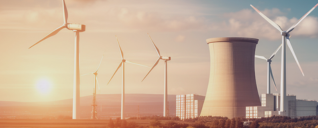
Who controls energy? The importance of energy sovereignty in the future – Ateneo
Energy is an essential resource for the functioning of society. Without energy, basic activities such as industrial production, mobility, heating of homes or essential services cannot be carried out. Despite its importance, the current energy system is strongly centralized in few handsa fact that generates dependence, speculation and inequalities in access to this fundamental resource.
Energy sovereignty is presented as an alternative that seeks to break this model and allow citizenship, communities and territories to have control over the production, distribution and use of energy. This approach is key to ensuring that energy is not only a market good, but a fundamental right managed democratically and sustained.
A model dominated by oligopolis
The current energy market is controlled by a small group of large companies they determine the prices, investments and type of energy that occurs. In Spain, the five main electric companies (Iberdrola, Endesa, Naturgy, Repsol and EDP) They concentrate most of the market, both in generation and in distribution and marketing.
This centralized model has several negative effects:
⚠ High prices and speculation: Energy prices fluctuate according to market logic, often responding to financial interests rather than in criteria of real need.
⚠ Dependence on fossil fuels: Despite the rise of renewable energy, the electrical generation still depends largely from pollutants.
⚠ Lack of citizen control: Decision -making on energy is in the hands of large corporations, without effective participation of citizens or local communities.
Does this reality make many people ask: energy must remain a business in the hands of a few companies, or should it be a democratically managed collective resource?
What is energy sovereignty?
The concept of energy sovereignty refers to the capacity of communities to produce, manage and consume their own energy autonomously and decentralized. This model is based on three major principles:
✅ Collective and democratic management: Energy must be under public or community control, with mechanisms for citizen participation in decision -making.
✅ Decentralization and proximity: The generation of energy must be done at a local level, taking advantage of the renewable resources available in each territory.
✅ Autonomy and sustainability: Reduce traditional energy market dependence and move towards a 100% renewable and efficient model.
This approach contrasts with the current model, in which energy is considered another commodity, subject to the logic of supply and demand.
Examples of energy sovereignty underway
Around the world, more and more communities and municipalities are developing models typical of energy generation and management. Then we highlight some inspirational cases:
Copenhagen (Denmark): The Danish capital has developed an energy model based on wind farms managed by citizen cooperatives, which cover an important part of the city’s electricity consumption.
Barcelona: In Catalonia, the Barcelona City Council has promoted this public renewable energy company, which allows citizens to hire electricity generated with sustainable sources.
Energy cooperatives in Germany: More than 900 cooperatives have developed decentralized production systems, where citizens are the owners of energy generation infrastructure.
We are energy: In our country, this renewable energy consumption cooperative has been a pioneer in promoting self -consumption and energy communities through a democratic management model.
Baix Llobregat: a territory with potential for energy sovereignty
The Baix Llobregat has a combination of high energy demand, industrial and cooperative fabric, and a strong presence of social and environmental movements. This reality makes it a territory with great potential for moving towards a more sovereign and democratic energy model.
Currently, several municipalities and entities are already promoting projects in this line:
✅ Shared self -consumption projects: Some municipalities, such as El Prat and Sant Feliu de Llobregat, have initiated initiatives to install solar panels in public facilities and share the energy generated with the citizenry.
✅ Network of Energy Cooperatives: The co -operative fabric of the region can be a key ally for developing energy communities, repeating successful models such as those in Germany or Denmark.
✅ Bet on energy transition from local administrations: Some councils in the Baix Llobregat have begun developing policies to foster self -consumption and energy decentralization.
What obstacles do you need to overcome?
Despite the potential of energy sovereignty, there are still several challenges that hinder their implementation on a large scale:
⚠ Little favorable legislation: Despite recent improvements, there are still bureaucratic obstacles for the creation of energy communities and self -management projects.
⚠ Dependence on the big companies: Energy infrastructures (distribution networks, generation plants) continue to be in the hands of large corporations.
⚠ Lack of financing and institutional support: The transition to a decentralized model requires major investments and public support.
The future: energy as a right, not as a commodity
The debate over the control of the energy is not only technical, but also political and social. The energy transition can not only be a technological change towards renewable sources, but it must be a paradigm shift in the way this essential resource is managed and distributed.
The energy sovereignty model argues that energy must be a democratically managed common good, and not a product controlled by a few companies to maximize benefits.
The Baix Llobregat has a unique opportunity to be a benchmark in this new model, promoting energy communities, cooperatives and decentralized production systems. This would not only benefit consumers, but would also contribute to the fight against climate change and the creation of a fairer economy and rooted in the territory.
The question we have to ask ourselves is not only what kind of energy we want, but also who must have the power to decide on it.








